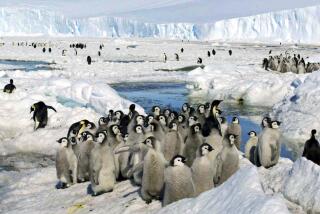Bid to ban commercial trade in polar bears fails
- Share via
An unusual coalition between the U.S. and Russia to win an international ban on commercial trade of polar bear parts failed Thursday.
Meeting in Bangkok, delegates to the 176-nation Convention on International Trade in Endangered Species voted down a U.S. proposal to elevate the polar bears’ status and effectively prohibit the lucrative trade in skins, teeth and claws from the animals, which are actively hunted in Canada.
The U.S. was joined in its campaign by Russia, which has battled widespread poaching of polar bears in recent years. But the effort met with opposition from Canada and Denmark, and was further sidetracked when the European Union attempted a compromise that would have allowed further study before an outright ban.
“The result was very disappointing, not just for us, but obviously for the fate of the world’s polar bears,” Andrew Wetzler, who spoke at the meeting on behalf of the Natural Resources Defense Council and two other conservation organizations, said in a telephone interview.
A total of 38 countries voted in favor of the U.S. proposal, with 42 against it, and 46 abstentions.
“It’s an unfortunate result after an ugly process,” added Brendan Cummings of the Center for Biological Diversity. “Countries and organizations that wanted to keep the international trade in polar bear skins going for political reasons had to distort or downplay the science showing polar bears are well on their way to extinction.”
About 25,000 polar bears exist around the world, two-thirds of them in Canada. The U.S. in its report to the convention said an average of 3,200 items made from polar bears were exported every year from Arctic countries, mainly Canada, representing about 400 to 500 polar bears.
The trade has become increasingly valuable, adding to the growing number of dangers to an animal already threatened by climate change. Two pelts sold at an auction last June in Ontario fetched a record $16,500 each.
“The current level of trade may have a detrimental impact on the status of the species because trade, particularly commercial trade, compounds the threat to the species posed by habitat loss,” the U.S. Fish and Wildlife Service said.
The Inuit population of northern Canada has fiercely defended rights to hunt the animals they have targeted throughout history and also to sell those they don’t need for subsistence use. Income from foreign trophy hunters and sales of pelts is crucial for many of the remote, impoverished villages of the far north.
“For the world to suggest that we’ll save the polar bears and forget the people, that’s a little backwards,” Terry Audla, president of Inuit Tapiriit Kanatami, which represents about 55,000 Inuit across Canada, told the Los Angeles Times in an interview last year. Audla also spoke at Thursday’s meeting in Bangkok.
In the U.S., polar bears are protected by the Endangered Species Act and the Marine Mammal Protection Act. Non-subsistence hunting and commercial trade in polar bear pelts is prohibited.
Canadian officials say they have carefully tailored regional hunting quotas designed to maintain healthy polar bear populations. Only about 2% of the Canadian polar bear population -- about 300 bears a year -- enters international trade, they said.
“Harvest quotas are based on principles of conservation and aboriginal subsistence, and are not market driven,” the Canadian government said in a report on the CITES issue. “International trade is not a threat to polar bears.”
But conservationists pointed out that the Canadian territory of Nunavut tripled its harvest quota for the most imperiled population of polar bears in 2011 and raised it again last year.
They are hoping to persuade the Obama administration to impose trade sanctions against Canada under international agreements, and are also challenging Canada’s commercial polar bear trade under the North American Free Trade Agreement.
“Polar bears are struggling for survival already,” said polar bear scientist Nikita Ovsyanikov, who was Russia’s delegate to the convention, according to the Guardian newspaper. “Exposing them to hunting will drive them to extinction.”
ALSO:
U.S. to send delegation to Chavez funeral
Number of Syrian refugees tops 1 million, U.N. says
Palestinian-only buses on West Bank stir controversy
More to Read
Sign up for Essential California
The most important California stories and recommendations in your inbox every morning.
You may occasionally receive promotional content from the Los Angeles Times.










